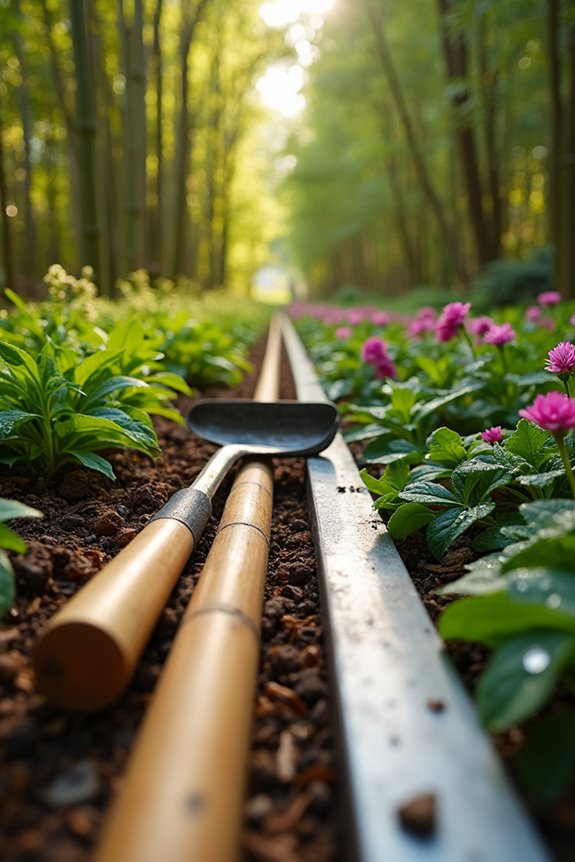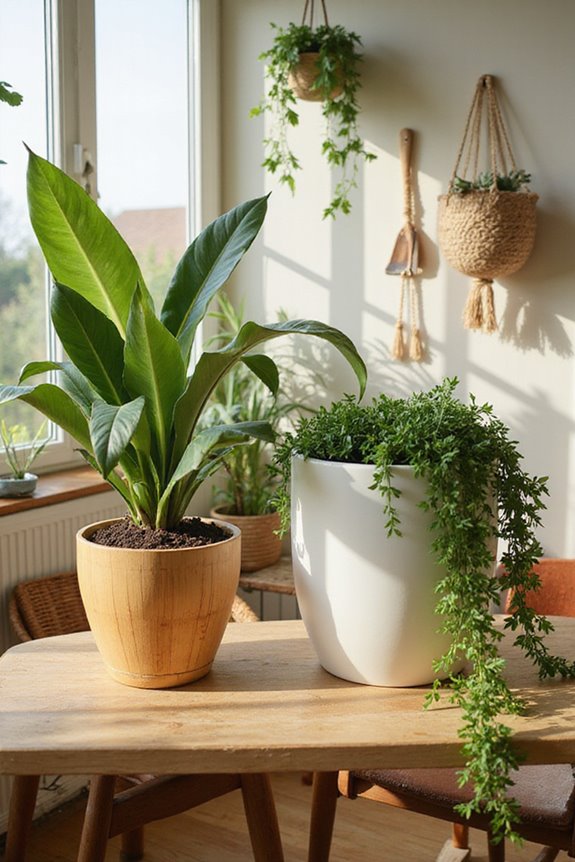When comparing bamboo and aluminum garden edging, we see distinct benefits. Aluminum is highly durable and requires minimal maintenance, making it ideal for structured designs. Bamboo, though eco-friendly and visually warm, needs regular upkeep to prevent deterioration. Both have unique aesthetics but suit different garden styles. Aluminum offers contemporary lines, while bamboo adds a rustic touch. Understanding these factors can help us choose the right option for our gardens and explore their features further.
Key Takeaways
- Durability: Aluminum is highly durable and weather-resistant, while bamboo requires regular maintenance to prevent rot and surface mold.
- Aesthetic Appeal: Bamboo provides a warm, natural look suitable for rustic settings, whereas aluminum offers a sleek, modern appearance for structured designs.
- Installation: Bamboo panels are easy to install and adapt to irregular shapes, while aluminum requires specialized tools and works best for straight lines.
- Cost: Bamboo is generally more affordable at around $2.40 per linear foot, compared to aluminum’s $1.50 to $6.00 per linear foot range.
- Environmental Impact: Bamboo is eco-friendly and renewable, while aluminum, although recyclable, has a higher environmental cost due to its production process.
Durability and Maintenance
When comparing bamboo and aluminum garden edging, durability and maintenance are key factors to contemplate. Bamboo offers impressive weather resistance, lasting over 20 years with proper care. However, it can be vulnerable to UV rays and moisture, requiring regular cleaning and sealing to maintain surface durability. On the other hand, aluminum is highly durable and resistant to weather without considerable degradation. It doesn’t mold or rot, making maintenance minimal—just occasional cleaning to prevent dirt buildup.
Here’s a quick comparison:
- Bamboo:
- Needs frequent cleaning and sealing.
- Can develop surface mold.
- Requires less upkeep.
- Sturdy for uneven terrain.
Ultimately, both materials have their strengths, but maintenance varies considerably. Additionally, choosing products from certified forests can enhance the sustainability of your garden edging choices.
Aesthetic and Style Considerations
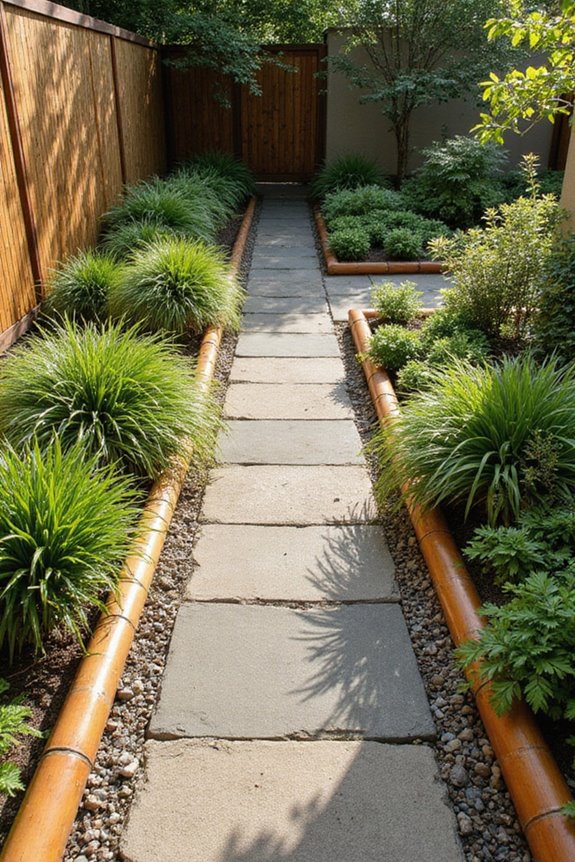
Aesthetic and style considerations play an essential role in choosing between bamboo and aluminum garden edging. Each material offers distinct aesthetic appeal that can enhance our gardens. Bamboo brings a warm, natural texture, ideal for rustic or Zen-inspired landscapes. Its organic color variations and evolving patina create a charming, relaxed atmosphere.
On the other hand, aluminum provides sleek, modern lines that suit contemporary and formal designs. Its polished finish and consistent color guarantee a refined look. Additionally, bamboo’s moisture resistance makes it a practical choice for various outdoor settings, ensuring longevity and durability.
To achieve design harmony, we should consider the overall theme of our garden. Bamboo works well in informal settings, while aluminum excels in structured environments. Balancing these styles can help us create inviting and cohesive outdoor spaces.
Environmental Impact and Sustainability
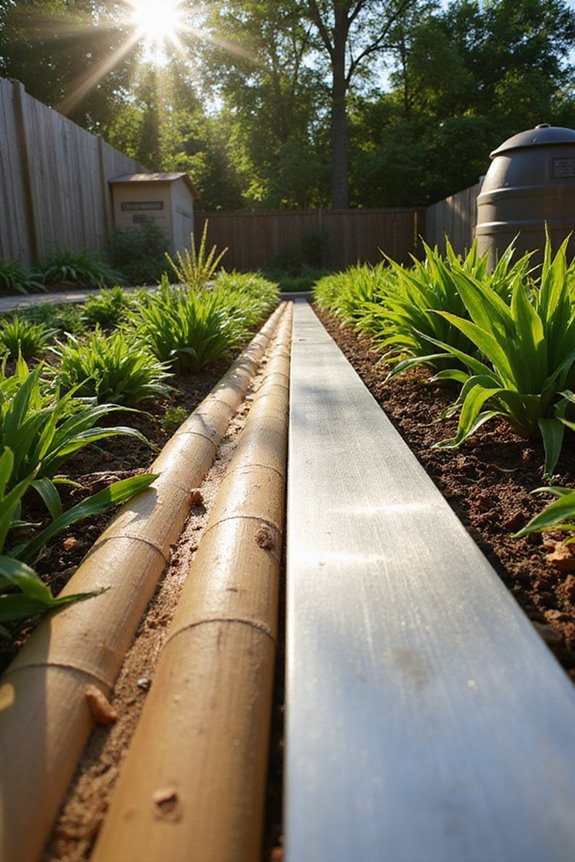
Environmental impact and sustainability are increasingly significant factors in our choice of garden edging materials. When we consider bamboo benefits, we notice its biodegradability and low carbon footprint. Bamboo grows rapidly, reaching up to 3 feet per day, and enriches soil when composted. This makes it an excellent eco-friendly option.
In contrast, aluminum has some notable drawbacks. Its production requires more energy and resources, leading to a higher environmental impact. While aluminum is recyclable, the recycling process varies in efficiency and can be energy-intensive. By choosing bamboo, we support local economies and reduce landfill waste, aligning with our shared values of sustainability. Making informed choices like these can lead us toward a greener future. Additionally, using native plants in your garden can further enhance biodiversity and promote a healthier ecosystem.
Installation and Versatility
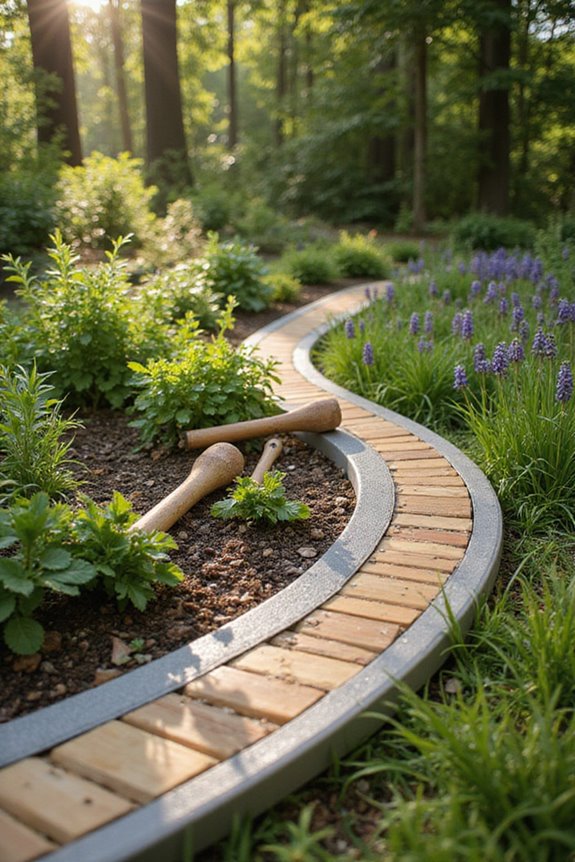
Installing garden edging can greatly impact the overall look and functionality of our outdoor spaces. Bamboo and aluminum offer different installation techniques that cater to various garden shapes. Bamboo edging often comes in preassembled panels, making it easy to install. We simply measure the perimeter and secure the panels with stakes. On the other hand, aluminum requires more tools and specialized connectors, especially for curves.
Bamboo’s flexibility allows it to adapt to irregular shapes, while aluminum works best for straight lines. Both materials can be adjusted post-installation; however, bamboo panels are more forgiving. This versatility makes bamboo perfect for informal gardens, while aluminum suits modern designs with clean lines. Additionally, bamboo is a rapidly renewable resource, making it an eco-friendly choice for gardeners. Ultimately, our choice depends on our garden’s character and layout.
Cost and Affordability
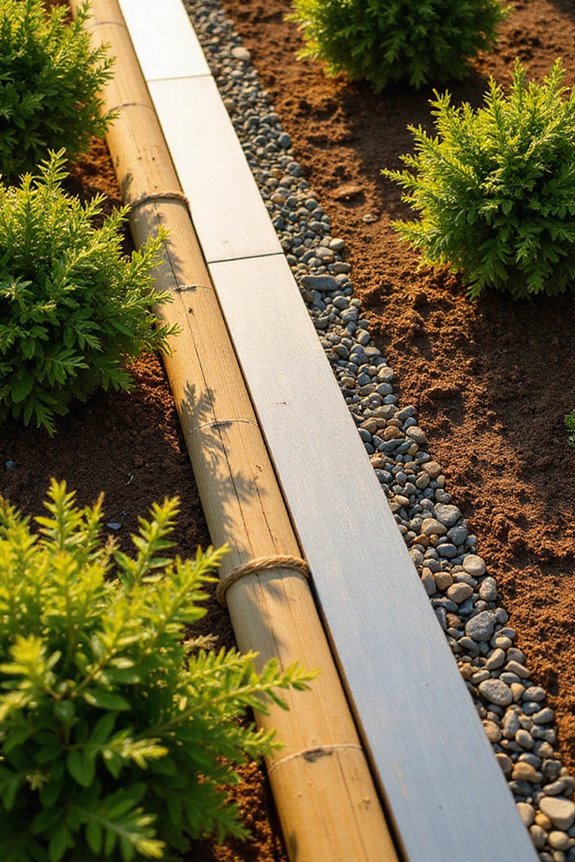
When considering garden edging options, cost and affordability play an essential role in our decision-making. Bamboo edging typically costs around $2.40 per linear foot, while aluminum ranges from $1.50 to $6.00. This price difference can influence our budgeting considerations considerably.
- Bamboo:
- Lightweight and easy to install; minimal labor costs.
- Prices can vary widely based on quality and sourcing.
- Moderate material prices but may incur higher installation costs due to required tools.
- Price trends fluctuate with market conditions.
Ultimately, we should weigh our short-term budget against potential long-term expenses. Choosing the right option means carefully evaluating both upfront costs and future needs.
Longevity and Long-Term Value
Longevity and long-term value are crucial factors to take into account when choosing garden edging materials. When we look at bamboo, its lifespan ranges from 5 to 10 years with proper maintenance. Regular care is essential, including seasonal cleaning and treatment against moisture and pests. On the other hand, aluminum edging typically lasts multiple decades with minimal upkeep.
Here are some key points to reflect on:
- Longevity Factors:
- Bamboo requires ongoing maintenance.
- Aluminum is naturally resistant to weathering.
- Bamboo offers an eco-friendly appeal but may need frequent replacement.
- Aluminum provides superior durability and less frequent replacement, translating to better long-term value. Additionally, bamboo is a rapidly renewable resource, making it an attractive option for sustainability-minded gardeners.
Choosing wisely will guarantee your garden remains beautiful for years to come.
Performance in Various Climates
Choosing the right garden edging material means considering how it performs in different climates. Aluminum offers excellent climate adaptability and temperature resilience. Its metal properties prevent cracking and warping in both hot and cold conditions. In contrast, bamboo can split or warp due to temperature fluctuations, making it less reliable in extreme weather.
- Moisture Resistance: Aluminum is rust-resistant and doesn’t absorb moisture, suitable for wet climates. Bamboo, however, can rot if not maintained.
- Wind Resistance: Aluminum’s weight provides stability against strong winds, while bamboo can easily become dislodged.
- Maintenance Needs: Aluminum requires minimal upkeep, while bamboo demands regular treatment to avoid deterioration.
User Experience and Preferences
How do users feel about the experience of installing and maintaining garden edging? Based on user feedback, preferences differ between bamboo and aluminum edging.
- Installation Ease: Aluminum edging is lightweight and flexible, making it easy to install, even in curves. Bamboo, while adaptable, may require more skill to secure properly.
- Maintenance Requirements: Users appreciate that aluminum needs minimal upkeep—just rinsing with water. In contrast, bamboo demands frequent sealing and monitoring, especially in wet climates.
- Durability: Aluminum is favored for its long-lasting nature and resistance to weather extremes, while bamboo tends to degrade faster without careful maintenance.
Ultimately, user preferences lean toward aluminum for its ease of installation and lower maintenance needs, aligning with practical gardening goals.
Final Thoughts on Choosing Edging Options
When we consider garden edging options, it’s important to weigh the pros and cons of each material. Aluminum offers durability and minimal maintenance, fitting well with modern design trends. It’s lightweight and easy to shape, making it great for various garden designs.
In a material comparison, bamboo is eco-friendly but requires regular upkeep to prevent rot and pests. It works well in natural gardens but isn’t as flexible in design.
Steel options, like Corten, provide durability and a rustic appeal, requiring little maintenance.
Ultimately, we must choose edging that fits our garden’s style, upkeep preference, and desired longevity. Incorporating sustainable materials can enhance the overall aesthetic while supporting an eco-friendly approach. Let’s think about what best complements our gardens while meeting our practical needs.
Frequently Asked Questions
How Do Bamboo and Aluminum Compare in Terms of Eco-Friendliness?
When we consider eco-friendliness, the sustainability factors and environmental impact of materials matter. Bamboo offers rapid renewability and lower emissions, while aluminum’s resource-intensive production raises concerns. Together, we can make more informed choices for our planet.
Can Bamboo Edging Be Painted or Stained for Customization?
Absolutely, we can paint or stain bamboo edging for customization! Let’s remember some bamboo maintenance tips and consider paint durability considerations to guarantee our project lasts, enhancing both beauty and longevity in our gardens.
What Types of Gardens Suit Bamboo or Aluminum Edging Best?
When choosing edging for flower gardens and vegetable plots, we should consider our garden’s style and needs. Bamboo suits natural designs, while aluminum fits modern themes, ensuring our spaces thrive beautifully and functionally together.
Are There Specific Brands of Bamboo or Aluminum Edging Recommended?
When exploring brand comparisons, we’ve found that product reviews highlight standout choices. For bamboo, Backyard X-Scapes impresses, while Gardener’s Supply shines in aluminum. Together, let’s create a garden that feels uniquely ours!
How Does Each Material React to Soil Acidity or Alkalinity?
When we consider soil interaction, we see bamboo thrives in slightly acidic conditions while aluminum struggles. Balancing pH not only supports bamboo’s growth but also enhances aluminum’s longevity, creating a harmonious garden for all of us.

